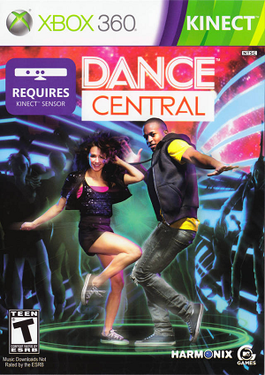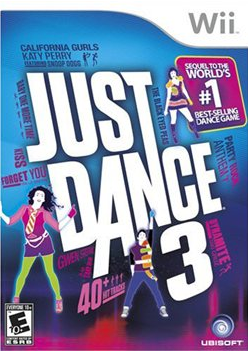
Tom Clancy's Rainbow Six: Vegas is the sixth game in the Rainbow Six series of video games. It was released in November 2006 for the Xbox 360, December 2006 for Windows, and in June 2007 for the PlayStation 3 and PlayStation Portable. The game's storyline follows a new team that is dispatched to Las Vegas, Nevada to defeat international terrorist Irena Morales and her army of mercenaries that are repeatedly attacking key locations in the city. A sequel developed by Ubisoft Montreal was released on Xbox 360, and PlayStation 3 consoles in March 2008 and on PC in April 2008. The game is also playable on Xbox Series X with online features still available.

Yourself!Fitness is an exercise video game, developed by Respondesign. It was published first for the Xbox, and later for PlayStation 2 and Microsoft Windows. Through a publishing deal with Ubisoft, Yourself!Fitness was ported to and released on the Wii in December 2008 under the name My Fitness Coach.

Dance Central is a music rhythm game for the Xbox 360 Kinect that was released in November 4, 2010 in most areas and in June 2, 2011 in Japan. It is the first installment in the Dance Central series.

Michael Jackson: The Experience is a music video game based on Michael Jackson's songs. It was developed and published by Ubisoft, and was released on 23 November 2010 in North America, 25 November 2010 in Australia and 26 November 2010 in Europe for the Nintendo DS, PlayStation Portable, and Wii. It was also released on 12 April 2011 in North America, 14 April 2011 in Australia and 15 April 2011 in Europe for PlayStation 3's PlayStation Move and Xbox 360's Kinect. The Japanese release on 8 December 2011 only revised the PlayStation 3, Xbox 360, and Wii consoles. The game features many of Michael Jackson's hits, such as "Bad", "Thriller", "Beat It", "Billie Jean", "Smooth Criminal", "Black or White", "The Way You Make Me Feel", etc. However, some songs like "Man in the Mirror" and "P.Y.T. " are excluded. Initial launches of the game included a limited edition replica of Jackson's sequined glove. It was later released for the Nintendo 3DS on 7 November 2011 in North America and 11 November 2011 in Europe, for iPhone and iPad on 7 December 2011 in North America and for PlayStation Vita on 15 February 2012 in North America, 22 February 2012 in Europe and 23 February 2012 in Australia. It was announced that the game would be released on Mac OS X, and iPad 2. The game sold 2 million units in two months, not including Japanese sales, making it one of the best-selling Wii title games.

Just Dance 3 is a 2011 dance rhythm game released on the Wii, Xbox 360, and PlayStation 3 with Kinect and Move support respectively for the latter two. It is part of the Just Dance video game series published by Ubisoft originally on the Wii and the third main installment of the series. Just Dance 3 was announced shortly after the release of Just Dance 2 and was released for the Wii and Xbox 360 on October 7, 2011 in North America and October 11, 2011 in Australia and Europe and for the PlayStation 3 on December 6, 2011 in North America, December 8, 2011 in Australia and December 9, 2011 in Europe. Just Dance 3 received positive reviews from critics and is the best-selling third-party Wii game of all-time, with sales of 9.92 million.

UFC Personal Trainer: The Ultimate Fitness System is a fighting and fitness video game created by THQ. The game requires the Kinect accessory for the Xbox 360 version and the PlayStation Move and PlayStation Eye Camera for the PlayStation 3 version. The Wii version does not require any additional accessories to play.

MotionSports is a sports video game released for the Xbox 360 in November 2010 by Ubisoft. It was one of the first games released for use with the Kinect motion sensing device.

Your Shape: Fitness Evolved is a fitness game developed and published by Ubisoft. The game was released in November 2010 as a launch title for Kinect, a motion tracking sensor accessory for the Xbox 360. It was later ported to Japan for release on December 9, 2010. It is a sequel to Your Shape, making it the second game in the franchise.

Kinect Star Wars is a Star Wars video game developed by Terminal Reality and published by LucasArts and Microsoft Studios for the Xbox 360 that uses the Kinect motion peripheral. The game features four game modes: "Jedi Destiny", the primary game mode; podracing; Rancor Rampage; and Galactic Dance-off. In Jedi Destiny, players assume the role models of Jedi Padawans as they wield their lightsabers and use the Force to attack enemies mostly from the prequel trilogy using gestures. Podracing is a race-based game mode, Rancor Rampage is a destruction-based game mode, and Galactic Dance-off is a dance-based game mode similar to the Dance Central series.

Kinect Sports: Season Two is a sequel to Kinect Sports co-developed by Rare and BigPark, and published by Microsoft Studios. It was unveiled at E3 2011's Microsoft Conference for Kinect and released in October 2011. The game adds six new sports and voice control. As with the previous game, it requires the Kinect sensor. Along with its predecessor Kinect Sports, it has been released in the Kinect Sports Ultimate Collection bundle on 18 September 2012 with additional bonus content and extra sports in Season Two added, basketball, golf and skiing.

Blackwater is a first-person shooter video game developed by Zombie Studios with the player assuming the role of a Blackwater Worldwide contractor. The game was first revealed at E3 in 2011, and was later released that year on the Xbox 360, published by 505 Games. Using the Kinect accessory for the console, the game is the first Kinect shooter on the market.

Raving Rabbids: Alive & Kicking known as simply Rabbids: Alive & Kicking, and as Rabbids: Fuori di schermo in Italy, is a Xbox Kinect party video game developed by Ubisoft Paris and Ubisoft Milan and published on December 26, 2011 in Australia, February 10, 2012 in Europe and March 20, 2012 in North America for the Xbox 360. This is the sixth game from the Rabbids games franchise and it is the first Rabbids game not released on the Nintendo Wii. The game was exclusively developed for the Kinect and consists of mini-games with up to 4 players.

The Black Eyed Peas Experience is a music video game based on songs by The Black Eyed Peas. It was developed by Ubisoft Quebec for the Wii and iNiS for the Xbox 360's Kinect, published by Ubisoft and released in November 2011.

Rayman Legends is a platform video game developed by Ubisoft Montpellier and published by Ubisoft. It is the fifth main title in the Rayman series and the direct sequel to the 2011 game Rayman Origins. The game was released for Microsoft Windows, PlayStation 3, Xbox 360, Wii U, and PlayStation Vita platforms in August and September 2013. PlayStation 4 and Xbox One versions were released in February 2014, with a Stadia version released in November 2021. A Nintendo Switch port, titled Rayman Legends Definitive Edition, was released in North America, Europe and Australia on September 12, 2017.

Marvel Avengers: Battle for Earth is a video game developed by Ubisoft Quebec and published by Ubisoft for the Xbox 360 and the Wii U. The game is heavily based on the "Secret Invasion" storyline in Marvel comic books. The game was announced after the cancellation of the original The Avengers game based on the 2012 film of the same name, being developed by THQ. Battle for Earth was released in North America on October 30, 2012 for the Xbox 360, followed by the Wii U version on December 4. It was the first and currently only Marvel video game to be published by Ubisoft.

Fighter Within is a Kinect-based fighting game developed by Belgian studio Daoka and published by Ubisoft. It was released on November 22, 2013 as an exclusive launch title for the Xbox One and a sequel to Fighters Uncaged (2010). It was panned by critics, with many considering it to be one of the worst video games of all time. X-One Magazine referred to it as one of the worst games in general.

Shape Up is a fitness game developed by Ubisoft Montreal and published by Ubisoft. It was released on Xbox One in November 2014 as a Kinect title. It was officially announced by Ubisoft at Electronic Entertainment Expo 2014.

Fighters Uncaged is a fighting video game for the Xbox 360 Kinect system. It was developed by AMA Studios and published by Ubisoft in November 2010. Fighters Uncaged was one of the first twelve games released for the Kinect. The game has the player control Simon, a man who is attempting to win an illegal fighting tournament to help get his father out of trouble with a crime lord. It has one game mode and features many different fighting moves and different settings and opponents. Simon is able to go up in leagues by obtaining certain numbers of points, which in turn unlock more scenarios and opponents. Following its release, Zuffa filed a lawsuit against Ubisoft for the usage of a trademarked term. Fighters Uncaged received poor reviews from critics, with many criticizing the tutorial and visuals, and citing its motion control system as the biggest issue they had with the game, which many considered to be broken.


















